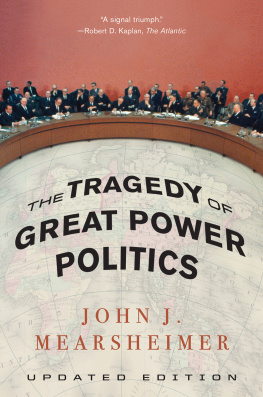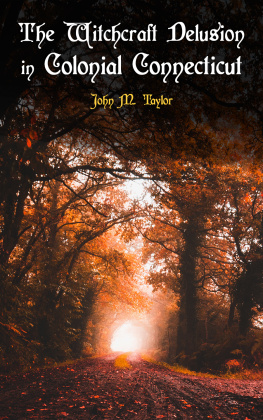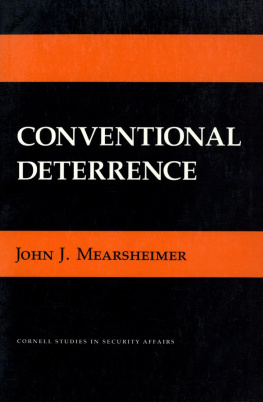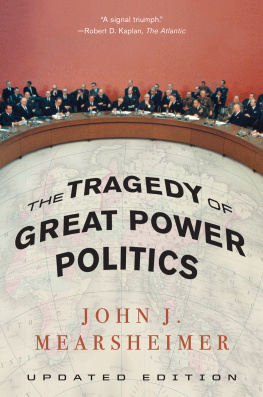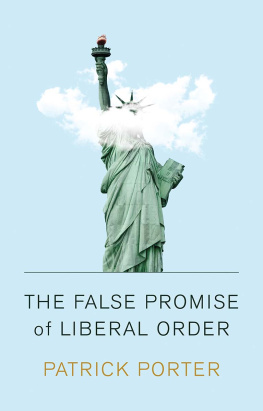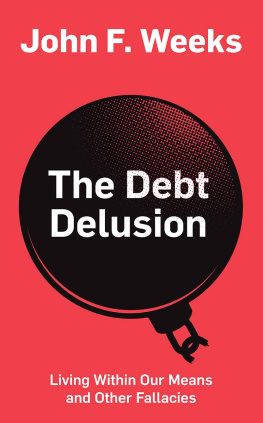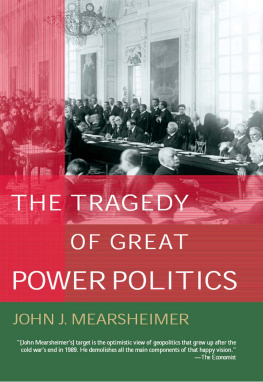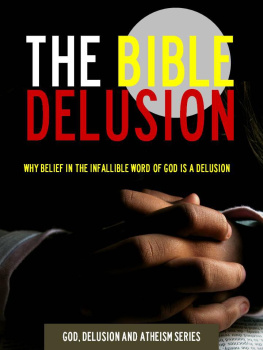John Mearsheimer - The Great Delusion: Liberal Dreams and International Realities
Here you can read online John Mearsheimer - The Great Delusion: Liberal Dreams and International Realities full text of the book (entire story) in english for free. Download pdf and epub, get meaning, cover and reviews about this ebook. year: 0, genre: History. Description of the work, (preface) as well as reviews are available. Best literature library LitArk.com created for fans of good reading and offers a wide selection of genres:
Romance novel
Science fiction
Adventure
Detective
Science
History
Home and family
Prose
Art
Politics
Computer
Non-fiction
Religion
Business
Children
Humor
Choose a favorite category and find really read worthwhile books. Enjoy immersion in the world of imagination, feel the emotions of the characters or learn something new for yourself, make an fascinating discovery.

- Book:The Great Delusion: Liberal Dreams and International Realities
- Author:
- Genre:
- Year:0
- Rating:3 / 5
- Favourites:Add to favourites
- Your mark:
- 60
- 1
- 2
- 3
- 4
- 5
The Great Delusion: Liberal Dreams and International Realities: summary, description and annotation
We offer to read an annotation, description, summary or preface (depends on what the author of the book "The Great Delusion: Liberal Dreams and International Realities" wrote himself). If you haven't found the necessary information about the book — write in the comments, we will try to find it.
The Great Delusion: Liberal Dreams and International Realities — read online for free the complete book (whole text) full work
Below is the text of the book, divided by pages. System saving the place of the last page read, allows you to conveniently read the book "The Great Delusion: Liberal Dreams and International Realities" online for free, without having to search again every time where you left off. Put a bookmark, and you can go to the page where you finished reading at any time.
Font size:
Interval:
Bookmark:
THE HENRY L. STIMSON LECTURES SERIES
LIBERAL DREAMS AND INTERNATIONAL REALITIES
JOHN J. MEARSHEIMER

The Henry L. Stimson Lectures at the Whitney and Betty MacMillan Center for International and Area Studies at Yale.
Copyright 2018 by John J. Mearsheimer. All rights reserved. This book may not be reproduced, in whole or in part, including illustrations, in any form (beyond that copying permitted by Sections 107 and 108 of the U.S. Copyright Law and except by reviewers for the public press), without written permission from the publishers.
Yale University Press books may be purchased in quantity for educational, business, or promotional use. For information, please e-mail (U.K. office).
Set in type by Westchester Publishing Services.
Printed in the United States of America.
Library of Congress Control Number: 2018941374
ISBN 978-0-300-23419-0 (hardcover : alk. paper)
A catalogue record for this book is available from the British Library.
This paper meets the requirements of ANSI/NISO Z39.48-1992 (Permanence of Paper).
10 9 8 7 6 5 4 3 2 1
WHEN I BEGAN WORKING ON THIS BOOK ten years ago, I had two different ideas about what the topic might be. First, I was interested in explaining why postCold War U.S. foreign policy was so prone to failure, sometimes disastrous failure. I was especially interested in explaining Americas fiascoes in the greater Middle East, which continued to accumulate, and the steady deterioration of U.S.-Russian relations, which culminated in a major rupture over Ukraine in 2014. This subject was all the more interesting because there was so much optimism in the early 1990s about Americas role in the world. I wanted to figure out what went wrong.
Second, I aspired to write a book about how liberalism, nationalism, and realism interact to affect relations among states. I have long considered nationalism a remarkably powerful force in international politics, but I had never examined that topic in detail. I had written a good deal about realism, however, and explored its differences with liberalism in several earlier works. I thought that it would be interesting to write a book comparing and contrasting these three isms, especially since I knew of no article or book that did this.
As I thought about the relationship between liberalism, nationalism, and realism, I came to realize that this trichotomy provided an ideal template for explaining the failures of U.S. foreign policy since 1989, and especially since 2001. At that point, my two reasons for writing this book fit together rather neatly.
My basic argument is that the United States was so powerful in the aftermath of the Cold War that it could adopt a profoundly liberal foreign policy, commonly referred to as liberal hegemony. The aim of this ambitious strategy is to turn as many countries as possible into liberal democracies while also fostering an open international economy and building formidable international institutions. In essence, the United States has sought to remake the world in its own image. Proponents of this policy, which is widely embraced in the American foreign policy establishment, believe it will make the world more peaceful and ameliorate the dual problems of nuclear proliferation and terrorism. It will reduce human rights violations and make liberal democracies more secure against internal threats.
From the beginning, however, liberal hegemony was destined to fail, and it did. This strategy invariably leads to policies that put a country at odds with nationalism and realism, which ultimately have far more influence on international politics than liberalism does. This basic fact of life is difficult for most Americans to accept. The United States is a deeply liberal country whose foreign policy elite have an almost knee-jerk hostility toward both nationalism and realism. But this kind of thinking can only lead to trouble on the foreign policy front. American policymakers would be wise to abandon liberal hegemony and pursue a more restrained foreign policy based on realism and a proper understanding of how nationalism constrains great powers.
The deeper roots of this book go back to my days as a graduate student at Cornell University. In the fall of 1976, I took the Field Seminar in Political Theory taught by Professor Isaac Kramnick. The class, which introduced students to the writings of seminal thinkers like Plato, Machiavelli, Hobbes, Locke, Rousseau, and Marx, had a greater impact on me than any other course I have ever taken. Indeed, I still have my notebook from that class, and over the years I have consulted it at least fifty times.
Three aspects of that seminar made it central to my intellectual development. First, I learned much about all sorts of isms, including liberalism, nationalism, and realism, and the course lent itself to contrasting them against each other. Second, it taught me that theory is indispensable for understanding how the world works. The reason I have referred back to the course notebook so many times is that I remembered particular arguments those theorists made that had significant implications for contemporary political issues. Third, I learned that one may talk and write about important theoretical issues in simple, clear language that is accessible to nonexperts. Although it was often hard to figure out exactly what the famous theorists on our reading list were saying, Professor Kramnicks ability to spell out their theories in straightforward language not only made them easy to understand but also made it clear why they are important.
The Great Delusion is intended to be theoretical at its core. The premise underlying the book is that theory is essential for understanding policy issues. But in the spirit of Isaac Kramnick, I have gone to great lengths to spell out my arguments as clearly as possible so that any well-educated and interested reader can grasp them. To put it bluntly, my aim is to be a great communicator, not a great obfuscator. Only the reader, of course, can determine whether I have succeeded.
I could not have written this book without the help of many very smart people. My greatest debt is to four individuals whose fingerprints are all over it: Eliza Gheorghe, Mariya Grinberg, Sebastian Rosato, and Stephen Walt. They not only made critically important conceptual points that caused me to alter particular arguments, but also spotted contradictions that I had missed and gave sage advice on how to reorganize chapters as well as the books overall structure.
The manuscript went through five major drafts before I turned it over to Yale University Press. In November 2016, after the second major draft, I had a book workshop featuring six scholars from outside the University of ChicagoDaniel Deudney, Matthew Kocher, John Owen, Sebastian Rosato, Stephen Walt, and Alexander Wendtwho were kind enough to read the entire manuscript and spend eight hours critiquing it in detail. Their feedback, both at the workshop and in subsequent email and phone exchanges, led me to make numerous changes, some of them fundamental.
Other participants at that book workshop, including my good friend Thomas Durkin, gave me sage advice on how the pursuit of liberal hegemony threatens civil liberties at home and facilitates the growth of a national security state. I also had the good fortune of having all my international relations colleagues at the University of ChicagoAustin Carson, Robert Gulotty, Charles Lipson, Robert Pape, Paul Poast, Michael J. Reese, and Paul Stanilandparticipate in the discussion. They too offered excellent comments that helped me tighten some arguments and forced me to alter others.
Next pageFont size:
Interval:
Bookmark:
Similar books «The Great Delusion: Liberal Dreams and International Realities»
Look at similar books to The Great Delusion: Liberal Dreams and International Realities. We have selected literature similar in name and meaning in the hope of providing readers with more options to find new, interesting, not yet read works.
Discussion, reviews of the book The Great Delusion: Liberal Dreams and International Realities and just readers' own opinions. Leave your comments, write what you think about the work, its meaning or the main characters. Specify what exactly you liked and what you didn't like, and why you think so.

